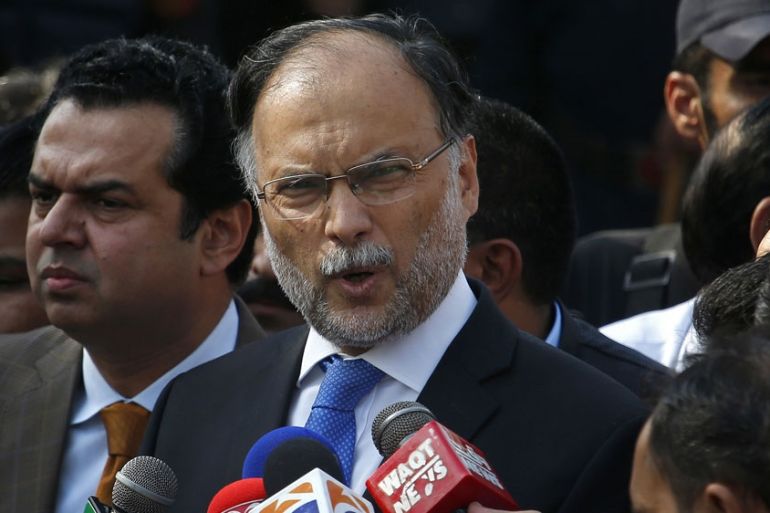Shooter of Pakistan’s Ahsan Iqbal linked to Tehreek-e-Labbaik
Suspect arrested for assassination attempt on Pakistan’s interior minister says he belongs to far-right religious group.

Islamabad, Pakistan – A suspect arrested for an assassination attempt on Pakistan’s interior minister says he is a member of a far-right religious organisation that has previously accused members of the government of committing blasphemy, police say.
Abid Hussain, said to be in his early 20s, was arrested from the scene of the attack in the central Pakistani district of Narowal, on Sunday, shortly after he fired a bullet that struck Interior Minister Ahsan Iqbal in the right arm, police told Al Jazeera.
Iqbal, 59, is “out of danger” and recovering in a hospital in the eastern city of Lahore on Monday.
The attack has, however, raised fears of violence in advance of a scheduled general election in July, with Iqbal’s ruling Pakistan Muslim League (PML-N) battling the opposition Pakistan People’s Party (PPP) and Pakistan Tehreek-e-Insaf (PTI) to remain in power.
“Our initial investigation shows that [Hussain] is associated with the Tehreek-e-Labbaik Pakistan,” police official Aitzaz Bashir told Al Jazeera. “He admitted this himself.”
Tehreek-e-Labbaik Pakistan (TLP), also known as Tehreek Labbaik Ya Rasool Allah (TLYRA), blockaded the Pakistani capital Islamabad for three weeks in November, demanding that the government rescind an electoral law amendment that saw a minor change in an oath that members of parliament are required to take.
At the time, TLP chief Khadim Hussain Rizvi led thousands of protesters to blockade a major highway entering the city, accusing members of the government, including Iqbal, of having committed “blasphemy” by allowing the change.
The sit-in eventually ended after the government capitulated to the group’s demands in a deal brokered by Pakistan’s powerful military.
Blasphemy is a sensitive issue in Pakistan, where at least 74 people have been killed in connection with accusations of having insulted Islam, its Prophet or the Quran, according to an Al Jazeera tally.
It is also a crime under Pakistani law, with certain forms punishable with a mandatory death penalty.
‘Call to kill blasphemers’
Rizvi, a firebrand right-wing Muslim leader, has long championed calls for those deemed to have blasphemed to be put to death.
Shortly after the attack on Sunday, however, the TLP chief disassociated himself from the attacker, saying his movement does not preach violence.
The claim runs counter to slogans chanted at the Islamabad sit-in and other TLP demonstrations, where protesters, led by Rizvi, shouted: “There is only one punishment for those dishonouring the Prophet: to remove their heads from their bodies!”
On Monday, a TLP spokesperson denied that Hussain was associated with the group.
“If people commit violence [in the name of the protecting the Prophet’s honour], or they call for it, they are doing it on an individual level, we do not condone violence as an organisation,” said Zubair Ahmed Kasuri.
Hussain is being interrogated by police in Narowal, which is Iqbal’s native district, and has been charged with attempted murder. Police say they are investigating his mobile phone records to ascertain whether he was instigated to attack the federal minister.
Iqbal had been leaving the venue of a small political gathering when he was attacked. The shooting has raised fears that members of the PML-N could be targeted as they begin campaigning for the general election in July.
At least 158 people were killed in dozens of attacks on political leaders, rallies and activists in the two months preceding Pakistan’s last general election in 2013, according to the Pakistan Institute for Peace Studies (PIPS).
Much of that violence was claimed by the Pakistan Taliban, also known as Tehreek-e-Taliban or TTP, an armed religious group that has been battling the Pakistani state since 2007, demanding the imposition of a strict interpretation of Islamic law on the country.
Violence perpetrated by the Pakistan Taliban has dropped dramatically in recent years, following Pakistani military operations to displace the group from its former strongholds in the country’s northwestern tribal districts.
Analysts warn, however, that vigilante attacks against perceived “blasphemy” could be far more unpredictable and difficult to combat.
“Because there is [currently] no organised Islamist insurgency, you are more likely to see these kinds of lone wolf attacks [aligned on issues of blasphemy],” said Umair Javed, a political analyst. “And there may be a kind of copycat element to this.”
Asad Hashim is Al Jazeera’s Digital Correspondent in Pakistan. He tweets @AsadHashim.